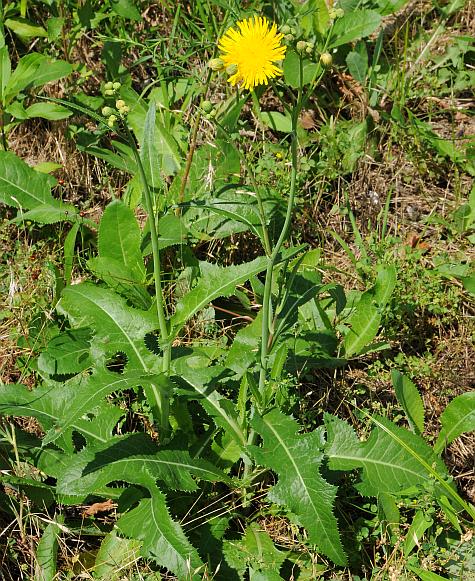Sonchus arvensis L.
Field Sow Thistle

Introduced
CC = *
CW = 3
MOC = 4
© SRTurner
Sonchus arvensis L.Field Sow Thistle | |
 |
Introduced CC = * CW = 3 MOC = 4 |
© SRTurner |
|
Family - Asteraceae/Cichorieae Habit - Perennial forb with deep-set, branched rhizomes. Sap milky.
Stems - Ascending to erect, to 1.5 m, sometimes multiple, sometimes branched, hollow between the nodes, glabrous, often somewhat glaucous.
Leaves - Alternate and basal, sessile (stem) or sometimes petiolate (basal). Stem leaves with the clasping basal lobes rounded or pointed, the margins with the teeth having relatively stiff, short, slender prickles at the tips, the upper surface glabrous, only slightly shiny, the undersurface glabrous or rarely sparsely pubescent with minute hairs. Basal and lower stem leaves 6-40 cm long, usually irregularly and deeply lobed. Median and upper stem leaves gradually reduced in size, variously shallowly or deeply lobed, sometimes unlobed and merely toothed.
Inflorescences - Terminal irregular panicles, with heads solitary or in loose clusters at branch tips. Branches glabrous or pubescent with spreading, gland-tipped hairs, occasionally with minute, branched, cobwebby to woolly hairs toward the tip. Small bracts sometimes present at branch points.
Heads - Flowering heads ligulate, 2.5-4.5 cm in diameter (measured across the spreading corollas). Involucre cup- or bell-shaped, 14-22 mm long, glabrous or sparsely to moderately pubescent with a central band of spreading, gland-tipped hairs, occasionally with minute, branched, cobwebby to woolly hairs toward the base. Involucral bracts in 2-3 series. Receptacle naked, slightly concave.
Flowers - Ligulate florets 80-250 or more per head. Corollas 12-25 mm long, bright yellow to orangish yellow. Disk florets absent. Pappus of numerous apparently smooth bristles 8-14 mm long, these white, often shed irregularly at fruiting.
Fruits - Achenes 2.5-3.5 mm long, noticeably 5-8-ribbed on each face, also finely cross-wrinkled, reddish brown to dark brown.
Flowering - June - October. Habitat - Roadsides, gardens, railroads, disturbed areas. Origin - Native to Eurasia. Lookalikes - Numerous other members of the Cichorieae tribe of the Asteraceae. Other info. - This rather showy species is uncommon in Missouri. It is far more common in states to our north and west. The plant is recognized by its large ligulate (dandelion-like) heads and alternate, clasping leaves with spiny margins. Relative to its more common sibling S. asper, S. arvensis has much larger flowering heads, longer inflorescence branches (and thus more open inflorescence panicles), and less aggressively spiny leaves. S. arvensis is also rhizomatous, and the plants will often have offset sprouts present nearby. Photographs taken in Wausau, WI., 8-6-04 (DETentaglia); also in St. Louis, St. Louis County, MO, 7-23-2015, near Goodrich, Genesee County, MI, 7-3-2016, and in Fremont, Newaygo County, MI, 8-29-2020 (SRTurner). |